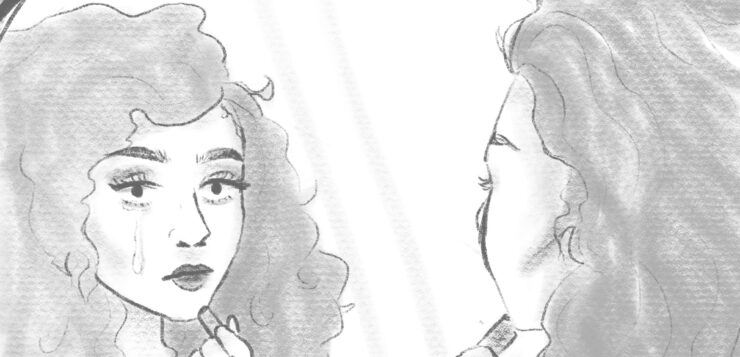The women in my family have never left the house without makeup. Not even for a run to the grocery store or when being rushed to the hospital. No matter the circumstances of the outing, one thing remained constant: the necessity of using cosmetics as a shield. Although it was never explicitly stated, at a young age, I internalised the message that pretty is the price you pay to exist as a woman in this world. I learned that makeup could be a form of protection: something you wear to keep people from seeing the ‘unattractive‘ self beneath, something to shield yourself from other people’s judgement.
As a child who loved my pet chickens more than dress-up, who would rather swim with sharks than play Barbies, no one ever told me I was ugly. No one ever told me I had to wear makeup. But I heard it beneath the remarks that women made to one another – ‘I haven’t put on my face today’, ‘I can’t let anyone see me like this!’ – and in the references to giving birth while wearing a full face of makeup like armour. That was how I absorbed the message that ugly was the worst thing any woman could be. And so I wondered if self-loathing was inevitable. I wondered if I would one day care what I looked like, if hating yourself was an automatic switch that had to flip for every girl. And for me, it did indeed.
A battle with severe eczema decimated my confidence. People with the best of intentions often asked me if I had been a victim of a car crash. Everywhere I went, people stared at my inflamed skin as if I was the bearer of some contagious, disfiguring disease. And so I learned to hate myself, to dread every class picture, and every moment when my eyes met the mirror. I learned to define myself as the ‘worst thing any woman could be.’ I learned how to mask my own self-hatred.
In college, I woke up a full hour and a half before my earliest class of the day. And every day, I spent that hour and a half blowing out my hair and shielding my insecurities behind concealer and lipstick. I wore high heels to class every day and pointed to my aching feet as proof of my socially acceptable womanhood, fully believing that beauty is pain. I hoped that investing in my appearance might distract people from my eczema and hoped that perfect grades would distract me from my pain. And while I battled suicidal ideation every time I scored less than 90% on an essay, I perpetuated the toxic belief that as long as I looked pretty, I was okay.
But years later, after surviving a traumatic and abusive relationship (and discovering feminism), I learned that there are worse things than going out without makeup. There are worse things than being perceived as ‘ugly‘. As trite as it sounds, what’s on the inside matters most. And covering your pain with makeup doesn’t make anything okay. It doesn’t make you better, stronger, or prettier than anybody else.
In fact, performative femininity is toxic because it perpetuates the patriarchal ideology that women exist to be objectified and sexualised. And when you make an active effort to look ‘pretty‘ or ‘feminine‘ for anybody but yourself, you play right into that toxicity. The truth is that women don’t owe performative beauty or femininity to anyone, and you don’t have to conform to traditional representations of womanhood in order to be taken seriously. What matters most is who you are on the inside. And that person should be someone who knows her own worth and likes who she is.
But it takes a long time to unlearn the culture of performative femininity that girls absorb like osmosis. It takes strength to evaluate your choices on a regular basis and ask yourself, ‘Am I doing this because this makes me happy? Or because I’ve been brainwashed to believe it makes me happy?‘ When we are conditioned to believe that adherence to patriarchal beauty standards leads to acceptance and validation, it can be hard to know if your relationship with femininity is really your own.
But I do believe that you can enjoy being feminine without conforming to toxic beauty standards. It just takes a little bit of critical thought. For example, my favourite colour is pink. And I think I own every eyeshadow palette Too Faced has ever made. But I don’t wear makeup all the time anymore. I don’t enjoy traditionally feminine aesthetics because I believe it will make me more acceptable to other people. In an active effort to distance myself from my own former toxic behaviour, I’ve also gone out in public barefaced on a number of occasions. (And, shockingly, it didn’t make me hate myself!)
So, now, when I do wear makeup, it’s because pretty eyeshadow palettes make me happy or because I love the way a certain lipstick matches my sweater. However, with or without makeup, I still sometimes struggle with wondering if I’m ‘pretty enough‘. But I’ve learned to stop letting these thoughts define my choices, my self-image, or my self-worth. At the end of the day, what matters is that everything I do or don’t wear is ultimately for me.




